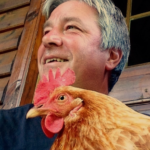
Hens will reduce egg laying in winter, and it’s not just because of the cold. The fewer daylight hours make the difference, as hens rely on light to regulate their laying cycles. Typically, a hen needs about 14-16 hours of light daily to maintain regular egg production.
So when winter hits and daylight drops, egg production usually follows suit.
Temperature also plays a crucial role. Hens are pretty hardy, but when temperatures dip too low, their bodies start using energy to stay warm instead of producing eggs. Keeping an eye on the coop’s temperature can help maintain a comfortable environment for your flock.
Stress is another factor that can affect egg production.
Winter storms, predators, and even changes in the daily routine can stress out your chickens. Stress messes with their hormones and can lead to fewer eggs. It’s important to create a cozy, safe space for your hens where they can feel secure and free from disturbances.
Lastly, feeding patterns and nutrition can also impact winter egg production. Hens need a well-balanced diet year-round, but supporting their dietary needs during colder months is essential.
Their energy requirements increase in winter, and without proper nutrition, their bodies might prioritize staying warm over laying eggs.
Optimizing Hen Environment for Winter Egg Production
Providing enough light can trick your hens into thinking the long days of summer are still here. A simple strategy is using artificial lighting in the coop. Set a timer to ensure your hens get about 14-16 hours of light daily. It doesn’t need to be too bright; even a low-watt bulb can make a big difference.
Maintaining coop warmth is another key factor. While hens are pretty resilient, extreme cold can curb their egg-laying. Insulating the coop and sealing drafts is crucial.
A small heater can help when it’s very cold, but ensure it’s safe and doesn’t risk starting a fire. You do not want your chickens to become dependent on a heater. Always provide plenty of bedding, like straw or wood shavings, so your hens can snuggle in and stay warm.
Ventilation might seem counterintuitive when keeping the coop warm, but it’s important. Proper airflow prevents moisture buildup, which can lead to frostbite and respiratory issues. Ensure vents are open, unobstructed, and positioned to avoid direct drafts hitting your chickens.
Eliminating stress in the coop environment is also vital. Give your hens plenty of space to move around, roost, and nest comfortably.
Keeping predators out is a must; make sure your coop is secure with no gaps for unwanted visitors. Reducing sudden changes in their environment can also help keep your hens calm and focused on laying eggs.
Diet and Nutrition: Boosting Winter Egg Production
Certain foods can give your hens that extra boost needed to keep laying through the winter. Consider supplementing their diet with high-protein options like mealworms, fish, and soybean meals. These protein-rich foods help sustain their energy levels and support egg production.
Calcium is crucial for hens to produce strong eggshells. Oyster shells, crushed limestone, or ground eggshells mixed into their feed can boost calcium. Without enough calcium, hens might lay fewer eggs or produce eggs with weaker shells.
Eggshells should be mashed into very small pieces and sprinkled into food or served in a separate dish like oyster shells. I put whole shells in a freezer bag and when I get enough, I crush them by hand in the bag.
Balanced nutrition is the name of the game. A quality layer feed that includes essential nutrients—proteins, vitamins, and minerals—forms the backbone of a hen’s diet. Always read labels to ensure the feed meets nutritional requirements. Adjust the portions based on your flock’s needs, especially during the colder months.
Supplements and healthy treats can also make a difference. Kitchen scraps like greens, vegetables, and fruits can be beneficial.
Just avoid giving them anything harmful, like onions, garlic, or citrus fruits. Some good treats include apples (without seeds), pumpkins, and leafy greens.
Hydration is often overlooked but is critical for egg production. Ensure that water remains unfrozen throughout the day. Use heated waterers if necessary or bring fresh water multiple times a day. Dehydration can significantly impact egg laying.
Every little adjustment in their diet during winter can help keep those egg cartons full. Just remember, happy, well-fed hens are more likely to keep laying consistently!
Troubleshooting: Addressing Common Winter Egg Production Issues
Hens might stop laying eggs for several reasons. Health issues like mites, lice, and internal parasites can be culprits. Regularly check your flock for signs of these pests and treat them promptly (Fraxil is the same as Elector) with appropriate remedies.
Molting, when hens shed old feathers and grow new ones, usually in late fall, can sometimes be mistaken for egg-laying problems.
Hens might stop laying during molting, focusing energy on growing new feathers. It’s perfectly normal but can be managed by ensuring they have a high-protein diet to support feather growth.
Environmental factors like changes in the coop setup or new additions to the flock can stress chickens, affecting their egg production. Assess their living conditions and reduce any potential stressors. Keep the environment consistent and free from sudden changes or disturbances.
When all else fails, consulting a poultry veterinarian is a smart move. Sometimes, the issue might require professional intervention. Vets can provide insights, run tests, and suggest treatments you might not have considered.
Adjusting feeding practices based on environmental changes can also help. For instance, increasing the energy content of the feed during frigid weather or changing the feeding schedule to ensure hens get adequate nutrition throughout the day might make a difference.
Regularly updating your knowledge and adapting to your flock’s needs can help keep egg production steady even during the colder months.
Dave

Chickenmethod.com

HI Dave,
I am glad I came across your post. I am not a chicken owner, but I am a steady fresh egg buyer, living in a cold area of the U.S. My main supplier is often dropping production. Lately, it’s because of molting, but in the winter, it really goes down. I would assume she does her research on this, but perhaps this would be a a good link to share with her so that maybe her production stays steady and she can keep her customers supplied and happy!
– Scott
Hi Scott.
It’s good to hear from you again. Chickens will slow egg-laying due to molting. It takes a lot of egg-laying energy to replace much-needed feathers. Molting is a natural response chickens use to gear up for winter, like we would buy a new coat.
After molting comes winter, and daylight hours decrease to less than 14 hours, which is the magic number for dependable laying unless your source uses artificial light. Less light would explain the dropping of her egg numbers.
Thanks for stopping in. Keep eating those eggs. They are good for you.
Dave